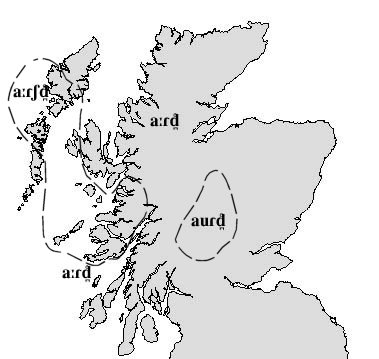An diofar eadar na mùthaidhean a rinneadh air "aːRd vs aːRʃd or Where the sh comes from"
| (3 mùthaidhean eadar-mheadhanach le 2 chleachdaiche eile nach eil 3 'gan sealltainn) | |||
| Loidhne 1: | Loidhne 1: | ||
We won't go into the discussion of whether this feature is Norse or Martian because unless you are hoping to become a historical linguist, it doesn't matter. | We won't go into the discussion of whether this feature is Norse or Martian because unless you are hoping to become a historical linguist, it doesn't matter. | ||
| − | So what | + | So what '''can''' we tell you about this strange [ʃ] that pops up in Gaelic? |
* It affects rt and rd groups in Gaelic. | * It affects rt and rd groups in Gaelic. | ||
| − | * Traditionally, not all dialects are affected, as you can see on the | + | * Traditionally, not all dialects are affected, as you can see on the map, and Perthshire Gaelic even diphthongises the [a]. Due to the pervasiveness of Lewis Gaelic in the media, teaching, and so on, this feature has spread into other dialects. So, the presence or lack of [ʃ] is no longer a clear cue to geographical origin. |
| + | |||
| + | [[Faidhle:ard.JPG]] | ||
*If it occurs, it tends to occur only in stressed syllables so ainneart for example tends not to have this intrusive [ʃ]. | *If it occurs, it tends to occur only in stressed syllables so ainneart for example tends not to have this intrusive [ʃ]. | ||
| − | *Some speakers tend to insert [ʃ] only in rt groups, but not rd groups, but never the other way round. Thus you | + | *Some speakers tend to insert [ʃ] only in rt groups, but not rd groups, but never the other way round. Thus, you'll hear speakers who pronounce ceart and àrd as [kʲaɹʃt̪] and [aːɹʃt̪] but '''never''' [kʲaɹt̪] and [aːɹʃt̪]. |
| − | Beyond that, there doesn't appear to be a clear rule, but we'll research this further | + | Beyond that, there doesn't appear to be a clear rule, but we'll research this further and see whether there actually is a rule. |
| − | + | For learners, it seems to be a good guideline to insert [ʃ] both in rt and rd groups in stressed syllables, that's to say first syllables. That won't sound wrong to a Gael's ears even if he does not pronounce the intrusive [ʃ]. Unless you're desperate to learn a particular dialect, which we don't recommend, you'll have to memorise your chosen dialect's rt and rd words. As far as we can see, the option to use [ʃ], or not, does not appear to be rule based. | |
To listen to some examples, check our [[Fuaimean na Gàidhlig]] section. | To listen to some examples, check our [[Fuaimean na Gàidhlig]] section. | ||
Am mùthadh mu dheireadh on 22:28, 28 dhen t-Sultain 2013
We won't go into the discussion of whether this feature is Norse or Martian because unless you are hoping to become a historical linguist, it doesn't matter.
So what can we tell you about this strange [ʃ] that pops up in Gaelic?
- It affects rt and rd groups in Gaelic.
- Traditionally, not all dialects are affected, as you can see on the map, and Perthshire Gaelic even diphthongises the [a]. Due to the pervasiveness of Lewis Gaelic in the media, teaching, and so on, this feature has spread into other dialects. So, the presence or lack of [ʃ] is no longer a clear cue to geographical origin.
- If it occurs, it tends to occur only in stressed syllables so ainneart for example tends not to have this intrusive [ʃ].
- Some speakers tend to insert [ʃ] only in rt groups, but not rd groups, but never the other way round. Thus, you'll hear speakers who pronounce ceart and àrd as [kʲaɹʃt̪] and [aːɹʃt̪] but never [kʲaɹt̪] and [aːɹʃt̪].
Beyond that, there doesn't appear to be a clear rule, but we'll research this further and see whether there actually is a rule.
For learners, it seems to be a good guideline to insert [ʃ] both in rt and rd groups in stressed syllables, that's to say first syllables. That won't sound wrong to a Gael's ears even if he does not pronounce the intrusive [ʃ]. Unless you're desperate to learn a particular dialect, which we don't recommend, you'll have to memorise your chosen dialect's rt and rd words. As far as we can see, the option to use [ʃ], or not, does not appear to be rule based.
To listen to some examples, check our Fuaimean na Gàidhlig section.
| Beagan gràmair | ||||||||||||
| ᚛ Pronunciation - Phonetics - Phonology - Morphology - Tense - Syntax - Corpus - Registers - Dialects - History - Terms and abbreviations ᚜ | ||||||||||||
